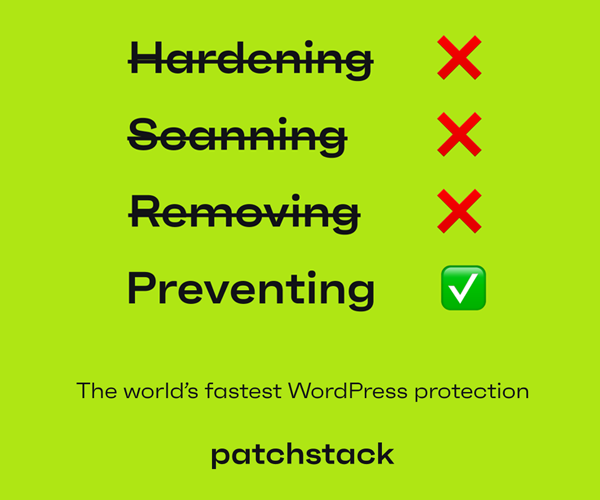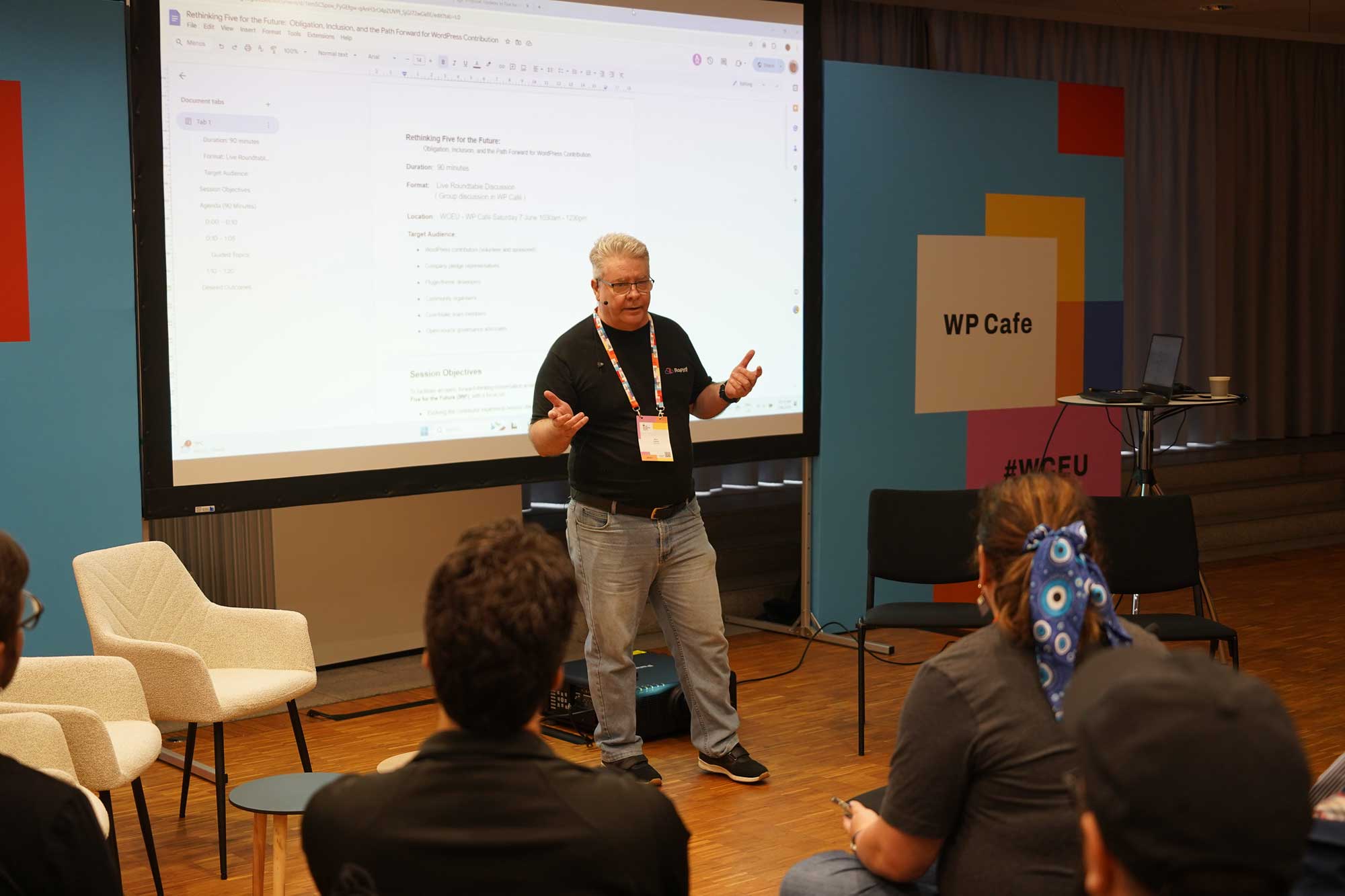A year ago, AspirePress didn’t exist. Today, it powers the download and update infrastructure for the FAIR project, the Linux Foundation-backed effort to decentralize WordPress core, plugin and theme distribution. But while FAIR made headlines with its public launch alongside WordCamp Europe 2025, AspirePress has remained largely under the radar — a small, volunteer-run initiative with big ambitions of its own.
Founded by developer and agency owner Sarah Savage in the weeks following WordCamp US 2024, AspirePress was born out of concern that WordPress.org had become a single point of failure for the WordPress ecosystem. When WP Engine was blocked from accessing WordPress.org and its resources, stoking fears that other companies might be next, Savage decided to act.
“She looked at it and said, well, we need to secure the supply chain,” said project manager Brent Toderash, who joined soon after. “That kind of uncertainty just isn’t acceptable for a platform that’s grown into the enterprise space.”
Savage had already registered the AspirePress name and domain for a different project. Within days, she repurposed it and started building. Others soon joined — developers, all volunteers — and today the AspirePress Slack has more than 180 members, with a half-dozen actively contributing to development.
More than a mirror
AspirePress isn’t a fork of WordPress, Toderash is quick to point out. Instead, it’s a modular distribution system built to serve WordPress core, plugins, and themes from alternative, independent sources. As of June 6, the project reached its “Everest” milestone: the release of version 1.0 of AspireUpdate, its signature plugin.
AspireUpdate enables site owners to choose their preferred software update source — whether that’s WordPress.org, AspirePress, or another FAIR-compliant mirror. Compatible with self-hosted WordPress sites, the plugin routes update requests through AspireCloud, a server that mirrors the WordPress.org API and responds with the correct download path for the requested package.
Complementing the plugin is AspireExplorer, a web-based plugin and theme browser that offers a familiar experience to WordPress.org. Explorer is still in active development, with improvements planned for search, filtering, and theme browsing.
Underpinning it all is AspireSync, a background tool that populates mirror repositories using bandwidth-friendly update requests. Combined with AspireCloud, it allows anyone to set up and serve their own mirror — the beginning of what the AspirePress team envisions as a distributed, federated, and eventually funded network of mirrors.
“We believe [Everest] represents the start of a sea change in how WordPress packages will be managed and updated in the future,” Toderash wrote in a launch blog post. “Securing the software supply chain… by moving it past a single-vendor solution.”
Thanks to a partnership with Fastly, AspirePress updates are now served from 97 global points of presence — adding to the 27 Automattic provides for WordPress.org, bringing the total to 124 data centers around the world. As Toderash notes, it’s the infrastructure that makes AspirePress more than just a proof-of-concept.
“This is a gift to the WordPress community,” he wrote in his post. “It is intended not to compete with, but to augment the software distribution channel.”
From “disaster mode” to federation
AspirePress was initially framed as a “disaster recovery” project — a stopgap solution to restore trust following WordCamp US 2024. But its goals have since expanded. “I want to say I feel like the community has come out of disaster mode,” said Toderash. “But we don’t want to get back into any sort of disaster.”
That’s where FAIR comes in
AspirePress became the technical foundation for FAIR’s update infrastructure. Its public codebase, licensed under GPL and MIT, enabled FAIR to move quickly. While the AspireUpdate plugin focuses on core, themes, and plugins, FAIR is building a more comprehensive alternative to the WordPress updater that also replaces events, news, and other API responses. But the update engine? That came from AspirePress.
“All of the plugin, theme, and core mirroring we rely on is AspirePress’s work,” FAIR technical steering committee co-chair Ryan McCue told The Repository last week. “If they hadn’t been doing that already, we wouldn’t have launched on time.”
Toderash described the collaboration as organic. “There were confidential conversations… speculative, really. As the FAIR coalition grew, it made sense for them to loop in [Sarah and me]… There was no reason to build the same infrastructure twice.”
Several contributors are working across both projects, including longtime core contributors Andy Fragen and Colin Stewart.
Built on trust, not budgets
AspirePress runs entirely on volunteer labor and donated infrastructure. No one is paid. Hosting is provided by Savage’s boutique hosting company, and a key in-kind contribution — global CDN distribution via Fastly — came through the Fast Forward open source program.
“There were a lot of [hours]. So that’s just hackers doing what they do,” said Toderash.
For now, the AspirePress team is focused on supporting FAIR, maintaining feature parity with WordPress.org, and gradually implementing the full FAIR spec — including cryptographic verification, decentralized identities (DIDs), and support for phased updates.
Toderash said the team is also exploring improvements like faceted search, filters for plugin freshness, and adding paid plugin support. “If we’re going to build a new package manager,” he said, “can we make it better?” He pointed to features like phased rollouts, plugin meta enhancements, and graceful fallback options for hosts. “Without breaking the compatibility, can we improve it so it has graceful improvement or graceful fallback?”
What’s next?
It’s still early days, and AspirePress hasn’t shared adoption numbers publicly. While some hosting companies have expressed interest, those conversations are currently being led by the FAIR team. Still, the project is gaining visibility among those exploring alternative mirrors and infrastructure solutions.
“We would like contributors,” said Toderash. “That includes developers, yes, but also copywriters, marketers, designers. You don’t have to be a coder.”
Anyone can get involved by requesting an invite to the AspirePress Slack community or submit pull requests via GitHub.
As for the long game, Toderash offered a metaphor: “A spider, if you cut off the head, that’s it, you’re done. But a starfish, you can cut off its arm and it’ll grow a new one. You cut it in half, you have two starfish. And that’s what decentralization is like.”








Leave a Reply